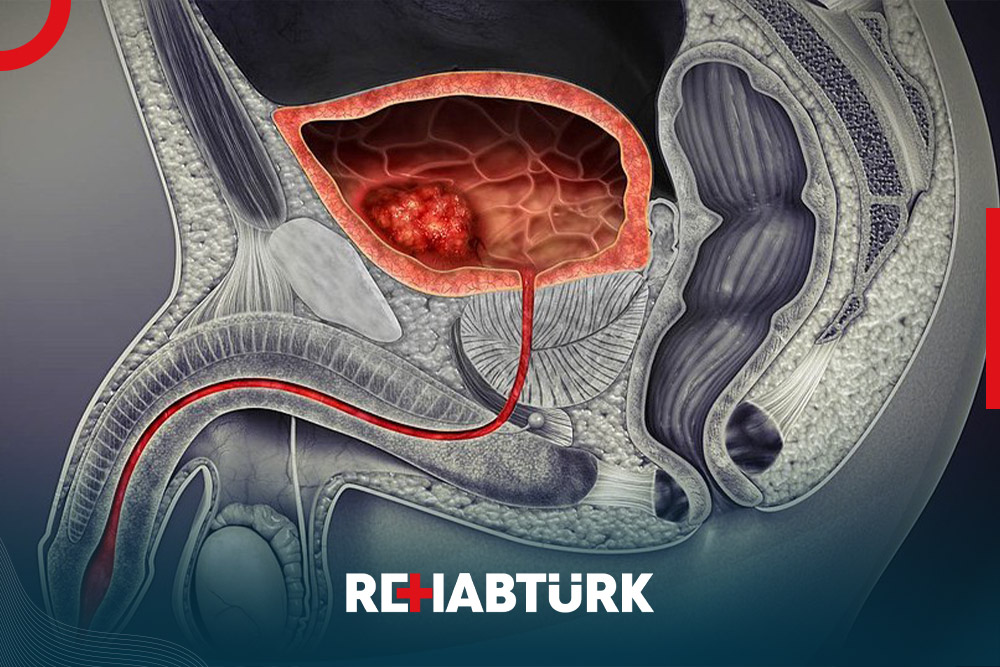Bladder cancer treatment in Türkiye
Bladder Cancer
Bladder cancer occurs in the tissues of the bladder, which is the organ in the body that holds urine.
Types of bladder cancer
There are three types of bladder cancer:
Transitional cell carcinoma:
It is the most common type of bladder cancer. It begins in the transitional cells in the inner layer of the bladder. Transitional cells are cells that change shape without being damaged when the tissue is stretched.
Squamous cell carcinoma:
It begins when thin, flat, squamous cells form in the bladder after a long-term infection or irritation of the bladder.
Adenocarcinoma:
It begins when glandular cells form in the bladder after long-term irritation and inflammation of the bladder. It is glandular cells that make up the mucous glands in the body.
What are the symptoms of bladder cancer?

Many people with bladder cancer can have blood in the urine but there is no pain while urinating. There are a number of symptoms that may indicate bladder cancer, such as fatigue, weight loss, and bone laxity. Special attention should be paid to the following symptoms:
- blood in the urine
- painful urination
- frequent urination
- Urgent urination
- Urinary incontinence (loss of bladder control)
- Pain in the abdominal area
- Pain in the lower back
What causes bladder cancer?
The exact cause of bladder cancer is unknown. It occurs when abnormal cells grow and multiply rapidly and uncontrollably and invade other tissues.
Who is at risk of developing bladder cancer?
Smoking increases the risk of bladder cancer. Smoking causes half of all bladder cancer cases in both men and women. The following factors also increase the risk of bladder cancer:
- Exposure to cancer-causing chemicals
- Chronic bladder infections
- Decreased fluid intake
- masculinity
- Age, as the majority of bladder cancers occur in people over the age of 55
- Eating a high-fat diet
- Hereditary cases of bladder cancer
- have had previous treatment with a chemotherapy drug called Cytoxan
- People who have had previous radiation therapy for cancer in the pelvic region
How is bladder cancer diagnosed?
A doctor may diagnose bladder cancer using one or more of the following methods:
- urinalysis
- Internal exam, which involves the doctor inserting gloved fingers into the vagina or rectum to feel for lumps that may indicate a cancerous growth
- Cystoscopy, which involves the doctor inserting a narrow tube with a small camera through the urethra to view the inside of the bladder
- A biopsy in which a doctor inserts a small instrument through the urethra and takes a small sample of bladder tissue to test for cancer
- CT scan of the bladder view
- intravenous pyelogram ( IVP )
- X ray
A doctor can evaluate bladder cancer by a staging system that goes from stages 0 to 4 to determine the extent of the cancer. The stages of bladder cancer mean the following:
- Stage 0: The cancer has not spread past the lining of the bladder.
- Stage 1: Cancer has spread past the lining of the bladder, but has not reached the muscle layer of the bladder.
- Stage 2: Bladder cancer has spread to the muscle layer of the bladder.
- Stage 3: Bladder cancer has spread to the tissues surrounding the bladder.
- Stage 4: Bladder cancer has spread beyond the bladder to nearby areas of the body.
How is bladder cancer treated?
The doctor works to determine the treatment that should be provided based on the type and stage of bladder cancer, the symptoms experienced by the patient and his general health.
Stage 0 and Stage 1 treatment
Treatment for stage 0 and stage 1 bladder cancer may include surgery to remove the tumor from the bladder, chemotherapy, or immunotherapy, which involves taking a drug that causes the immune system to attack cancer cells.
Stage 2 and Stage 3 treatment
Treatment for stage II and III bladder cancer may include:
- Removal of part of the bladder in addition to chemotherapy .
- Total cystectomy, which is the radical removal of the bladder, is followed by surgery to create a new way for urine to leave the body.
- Chemotherapy, radiation therapy or immunotherapy that may be done to shrink a tumor before surgery, to treat cancer when surgery isn’t an option, to kill remaining cancer cells after surgery, or to prevent cancer from recurring.
Treatment of stage IV bladder cancer
Treatment for stage IV bladder cancer may include:
- Chemotherapy without surgery to relieve symptoms and extend life.
- Radical cystectomy and removal of surrounding lymph nodes, followed by surgery to find a new way for urine to leave the body.
- Chemotherapy, radiotherapy and immunotherapy after surgery to kill remaining cancer cells or to relieve symptoms and prolong life.
- Clinical trial drugs.
protection
Because doctors don’t yet know what causes bladder cancer, it may not be preventable in all cases. Some of the following factors and behaviors can reduce your risk of developing bladder cancer:
- Non-smoking
- Avoid used cigarette smoke
- Avoid other cancer-causing chemicals
- Drink plenty of water
How can I book for bladder cancer treatment in Türkiye?

- Free medical support on the phone: You will have a dedicated representative for your health condition who is always ready to answer your questions.
- Free consultation with a specialist doctor: Your medical representative will consult with a number of doctors and hospitals to find the best possible treatments.
- Free travel visa arrangement: We will contact the embassy in your country to assist you in obtaining a visa to visit Türkiye.
- Free itinerary planning: We will create a schedule for your medical trip to Türkiye.
- Free translation of documents and reports: We will translate medical documents and reports into Turkish on your behalf.
- Free support and monitoring: We will monitor the stages of treatment and be by your side every step of the way.
- Free instant translation: We will be with you during the treatment stages to provide translation between you and the medical team.
- Free accommodation and transportation coordination: We will book accommodation for you and your companions in Türkiye, along with transportation services.
Contact REHABTÜRK doctors for more information about the procedure and to evaluate your medical condition.

